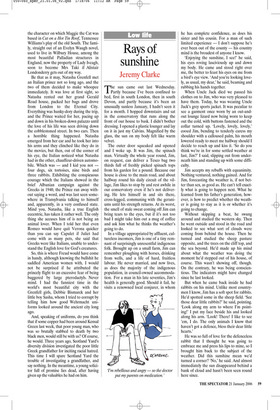Rays of sunshine
Jeremy Clarke
The sun came out last Wednesday. Partly because I’ve been confined to bed, first in south London, then in south Devon, and partly because it’s been an unusually sunless January, I hadn’t seen it for a month. I hopped downstairs and sat in the conservatory that runs along the front of our house to bask. I didn’t bother dressing. I opened a plastic lounger and lay on it in just my Calvins. Magnified by the glass, the sun on my body felt like warm velvet.
The outer door squeaked and opened and I woke up. It was Jim, the spinach man. Virtually the whole year round, Jim, on request, can deliver a Tesco bag two thirds full of freshly picked spinach tops from his garden for a pound. Because our house is close to the main road, and about halfway round his daily circuit of the village, Jim likes to stop by and rest awhile in our conservatory even if he’s not delivering. He lets himself in and sits there, cross-legged, communing with the geraniums until his strength returns. At its worst, the smell of stale sweat coming off Jim can bring tears to the eyes, but if it’s not too bad I might take him out a mug of coffee and ask him what he thinks the weather’s going to do.
In a village appropriated by affluent, cultureless incomers, Jim is one of a tiny remnant of surprisingly unresentful indigenous folk. Brought up on a small farm, Jim can remember ploughing with horses, drinking from wells, and a life of hard, fruitless labour. He never married, and now lives, as does the majority of the indigenous population, in council-owned accommodation. For a man in his late seventies, Jim’s health is generally good. Should it fail, he visits a renowned local conjurer, in whom he has complete confidence, as does his sister and his cousin. For a man of such limited experience — I don’t suppose he’s ever been out of the county — his country mind is the broadest of anyone I know.
‘Enjoying the sunshine, I see!’ he said, his eyes roving lasciviously up and down my body. He came and stood right over me, the better to feast his eyes on me from a bird’s eye view. ‘And you’re looking lovely, as usual, my dear,’ he said, beaming and rubbing his hands together.
When Uncle Jack died we passed his clothes on to Jim, who was very pleased to have them. Today, he was wearing Uncle Jack’s grey sports jacket. It was peculiar to see a garment once worn by an out-andout lounge lizard now being worn to keep out the cold, with buttons fastened and the collar turned up. ‘Lovely, lovely, lovely,’ cooed Jim, bending to tenderly caress my shoulder with a calloused palm, his mouth lowered ready to meet me halfway should I decide to reach up and kiss it. ‘So do you think we’re in for some settled weather at last, Jim?’ I said, slipping out from underneath him and standing up with some difficulty.
Jim accepts my rebuffs with equanimity. Nothing ventured, nothing gained. And for Jim, forecasting the weather is, if not better than sex, as good as. He can’t tell exactly what is going to happen next. What he learned from his father’s generation, however, is how to predict whether the weather is going to stay as it is or whether it’s going to change.
Without skipping a beat, he swung around and studied the western sky. Then he went outside and stood in the road and looked to see what sort of clouds were coming from behind the house. Then he turned and studied the sheep pasture opposite, and the trees on the cliff top, and the sea beyond. He’d made up his mind about what the weather was doing the moment he’d stepped out of his house, of course. This wasn’t showing off, though. On the contrary, he was being conscientious. The indicators might have changed since he last looked.
But when he came back inside he had rabbits on his mind. Unlike most countrymen I know, Jim has a soft spot for rabbits. He’d spotted some in the sheep field. ‘See those dear little rabbits?’ he said, pointing. ‘Look along my arm to where I’m pointing!’ I put my face beside his and looked along his arm. ‘Look! There! I like to see ’em, I do. The only animals I know that haven’t got a defence, bless their dear little hearts.’ He was so full of love for the defenceless rabbit that I thought he was going to embrace me and press his lips to mine, so I brought him back to the subject of the weather. Did this sunshine mean we’d turned a corner? ‘No,’ he said. And almost immediately the sun disappeared behind a bank of cloud and hasn’t been seen round here since.



















































 Previous page
Previous page